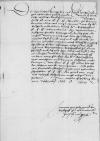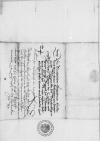 GStA PK, HBA, C1, No. 596, f. 2unnumbered
GStA PK, HBA, C1, No. 596, f. 2unnumbered
Dem durchleuchten, hochgebornen fursten unnd herren, herren ⌊Albrechten⌋, von Gottes gnad(en)
margraffen zw ⌊Brandenburg⌋, in Preussn on the margin, in the hand of other⌈⌊Preussn⌋Preussn on the margin, in the hand of other⌉, zw ⌊Stettin⌋,
⌊Pomern⌋, der ⌊Cassuben⌋ und ⌊Wend(en)⌋ hertzog, burgraff zw ⌊Nurmberg⌋ unnd furst zw ⌊Rugen⌋, unserm hochgunstigen, lieben herren unnd freundt /
Nechten spath yst uns E(uer) F(urstlichen) D(urchlauch)t ⌊⌋ zu komen, / doraus alles wol eingenhomen, was dy ko(niglich)e besigelte instruction durch ko(nigliche)n botschaffter(r) E(uer) F(urstlichen) D(urchlauch)t uberantwurt / den marienwerdyschenn handel belangend / in sich helt, / der wegen wir(r) uns auch myt dem hern ⌊schatzmeyster(r)⌋ dyse stunde noch notterfft beredt, / in darein geleytet ( wy im auch durch konniglich schriftlich befhel ufferlegt, / das er vor dass erst mit konniglichem botschaffter(r) zu samne kom(m)en und sich mit ihm alles entslisse ), das er(r) morgen und den donnerstag darnach uff mitlem wege zur ⌊Eyle⌋ des ko(nigliche)n botschaffters wyl warthenn, / und seynnem befhelich nachkomenn, / von dem E(uer) F(urstliche) D(urchlauch)t allen bericht der sachenn wirdt vornhemen. / Diss haben wir freuntdinstlicher(r), der gunst wir unss mt vleyss befhelenn, / nicht mugen vorhaltenn. /
Datum
⌊Heylsberg⌋, den XXIII
Septembr(is)
M D XXXIXt(en)
.
⌊Ioannes⌋, von Gots gnaden byschoff zu ⌊Ermelandt⌋ / qui sup(ra)
ma(n)u
p(ro)pria
 GStA PK, HBA, C1, No. 596, f. 2unnumbered
GStA PK, HBA, C1, No. 596, f. 2unnumbered
 GStA PK, HBA, C1, No. 596, f. 1unnumbered
GStA PK, HBA, C1, No. 596, f. 1unnumbered

